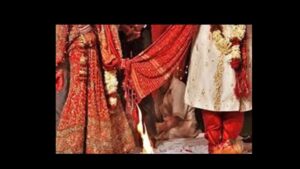Table of Contents
HINDU MARRIAGE
| SECTIONS | PARTICULARS |
| 5 | Conditions for a Hindu Marriage |
| 6 | Omitted |
| 7 | Ceremonies for a Hindu Marriage |
| 8 | Registration of Hindu Marriages |
| RESTITUTION OF CONJUGAL RIGHTS AND JUDICIAL SEPARATION | |
| 9 | Restitution of conjugal right |
| 10 | Judicial separation |

Conditions for a Hindu marriage (Section 5)
A marriage may be solemnized between any two Hindus, if the following conditions are fulfilled, namely
(I) Neither party has a spouse living at the time of the marriage
(ii) At the time of the marriage, neither party—
(a) is incapable of giving valid consent to it in consequence of unsoundness of mind; or
(b) though capable of giving valid consent, has been suffering from a mental disorder of such a kind or to such an extent as to be unfit for marriage and the procreation of children; or
(c) has been subject to recurrent attacks of insanity
(iii) The bridegroom has completed the age of 21 and the bride, the age of 18 at the time of the marriage;
(iv) the parties are not within the degrees of prohibited relationship unless the custom or usage governing each of them permits a marriage between the two
(v) the parties are not sapindas of each other, unless the custom or usage governing each of them permits of a marriage between the two;
Omitted (Section 6)
Omitted by the Child Marriage Restraint (Amendment) Act, 1978, (2 of 1978), s. 6 and Schedule (w.e.f. 1-10-1978)
Ceremonies for a Hindu marriage (Section 7)
- A Hindu marriage may be solemnized in accordance with the customary rites and ceremonies of either party thereto
- Where such rites and ceremonies include the Saptapadi (that is, the taking of seven steps by the bridegroom and the bride jointly before the sacred fire), the marriage becomes complete and binding when the seventh step is taken
Registration of Hindu Marriages (Section 8)
(1) For the purpose of facilitating the proof of Hindu marriages, the State Government may make rules providing that the parties to any such marriage may have the particulars relating to their marriage entered in such manner and subject to such conditions as may be prescribed in a Hindu Marriage Register kept for the purpose
(2) Notwithstanding anything contained in sub-section (1), the State Government may, if it is of opinion that it is necessary or expedient so to do, provide that the entering of the particulars referred to in sub-section (1) shall be compulsory in the State or in any part thereof, whether in all cases or in such matters as may be specified. Where any such direction has been issued, any person contravening any rule made on this behalf shall be punishable with a fine which may extend to twenty-five rupees.
(3) All rules made under this section shall be laid before the State Legislature, as soon as may be, after they are made
(4) The Hindu Marriage Register shall at all reasonable times be open for inspection and shall be admissible as evidence of the statements therein contained, and certified extracts from there shall, on application, be given by the Registrar on payment to him of the prescribed fee.
(5) Notwithstanding anything contained in this section, the validity of any Hindu marriage shall in no way be affected by the omission to make the entry
RESTITUTION OF CONJUGAL RIGHTS AND JUDICIAL SEPARATION
Restitution of conjugal right (Section 9)
When either the husband or the wife has, without reasonable excuse, withdrawn from the society of the other, the aggrieved party may apply, by petition to the district court, for restitution of conjugal rights and the court, on being satisfied of the truth of the statements made in such petition and that there is no legal ground why the application should not be granted, may decree restitution of conjugal rights accordingly.
Explanation.—Where a question arises whether there has been a reasonable excuse for withdrawal from society, the burden of proving a reasonable excuse shall be on the person who has withdrawn from the society
Judicial separation (Section 10)
(1) Either party to a marriage, whether solemnized before or after the commencement of this Act, may present a petition praying for a decree for judicial separation on any of the grounds specified in sub-section (1) of section 13, and in the case of a wife also on any of the grounds specified in sub-section (2) thereof, as grounds on which a petition for divorce might have been presented.
(2) Where a decree for judicial separation has been passed, it shall no longer be obligatory for the petitioner to cohabit with the respondent, but the court may, on the application by petition of either party and on being satisfied with the truth of the statements made in such petition, rescind the decree if it considers it just and reasonable to do so
MUST READ
HINDU MARRIAGE ACT, 1955 PART 1
MARRIAGE UNDER MUSLIM PERSONAL LAW
HOW TO FILE FOR MUTUAL DIVORCE 2022
